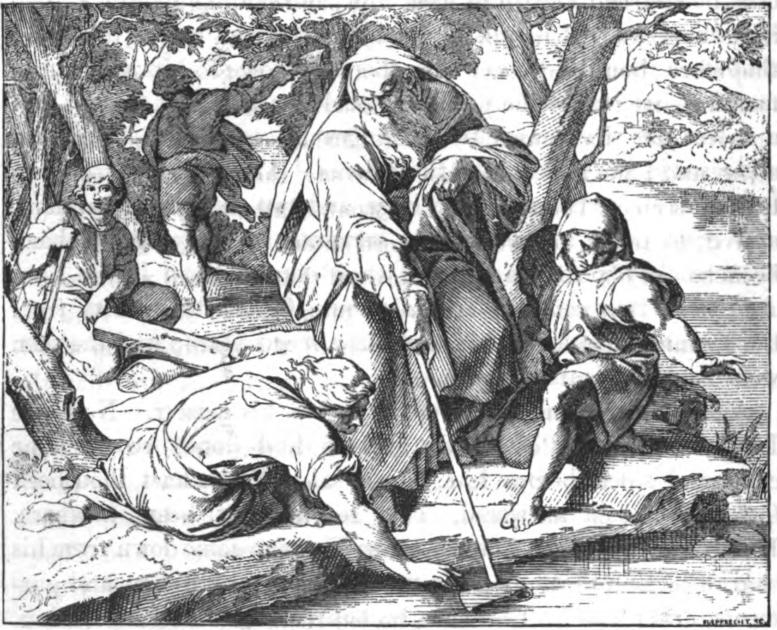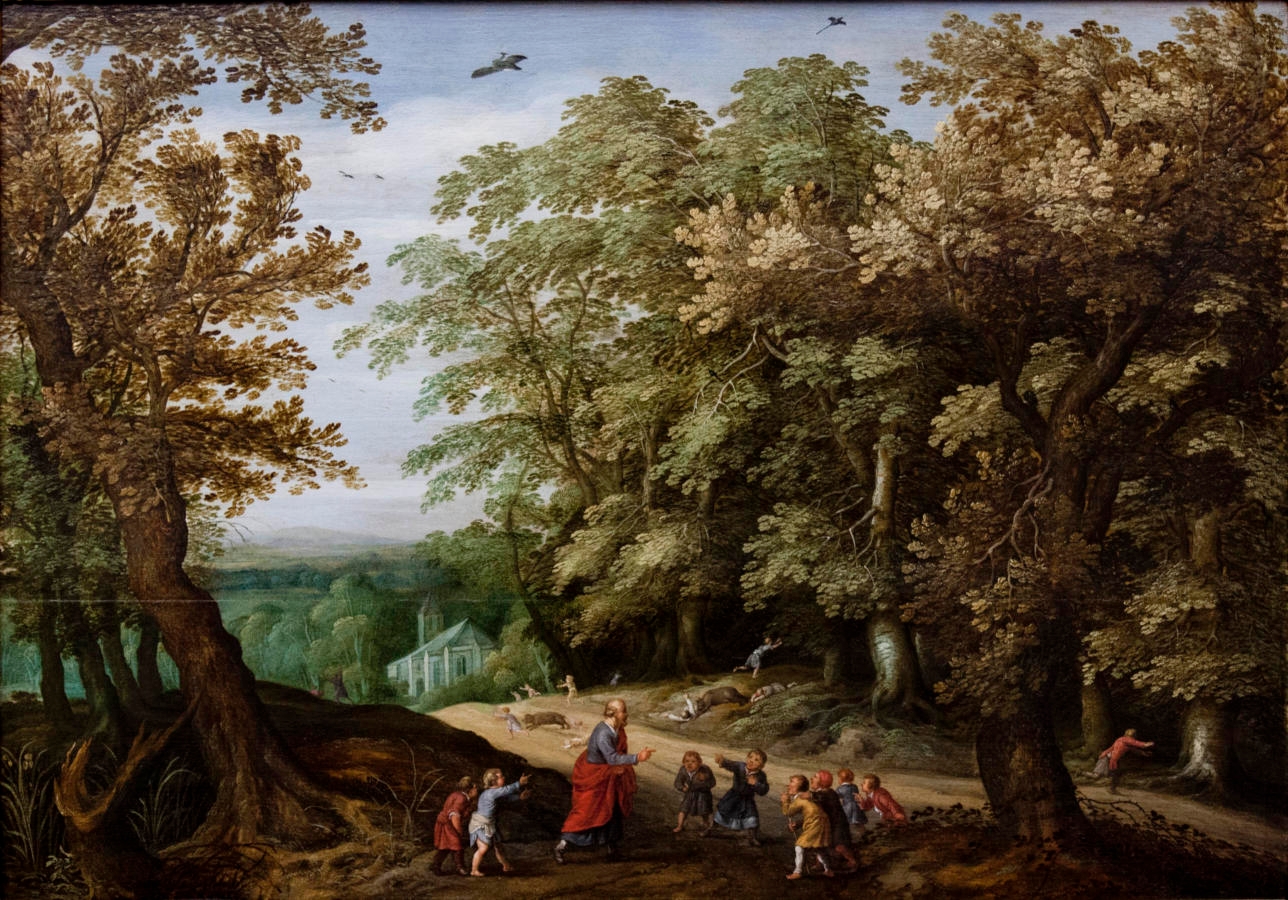Many who have attended a Passover seder — and made it through to the end — have concluded that seder by opening the door for Elijah, a 9th c. BCE prophet who, according to Jewish tradition, will herald the messiah. Elijah was a fascinating biblical prophet (his stories are found in the biblical book of II Kings) who advised and rebuked monarchs and worked wonders — conjuring food, raining fire down from heaven, raising the dead. Strangely, according to the Bible, Elijah never died, but was taken up to heaven in a fiery chariot. It is for this reason, perhaps, that he is, according to tradition, the prophet who will come back to announce the coming of the messiah.
But this piece isn’t about Elijah — it’s about his protégé, Elisha. Like his famous mentor, Elisha advised kings and wrought wonders. In fact, in the biblical story, Elisha seems to have worked even more wonders than his mentor! Though Elisha is lesser known — and, to be fair, he did not ascend to heaven to live forever — he is no less fascinating. In addition to performing an extensive set of miracles, he was a character of deep passion, compassion, and contradictions.
Though Elisha travels with Elijah for many years, his true prophetic work begins when Elijah departs the earth. After Elijah is taken up to heaven, Elisha picks up Elijah’s fallen mantle — literally. This biblical scene is in fact the source of the English expression. And from that point, Elisha begins performing miracles as a full-fledged prophet.
Like many prophets, Elisha advises kings of Judah and Israel in military matters. He secures the safety of Israel and Judah against the rebellions and invasions of foreign nations Moab and Aram. And yet, he also attends to Israel’s foes: for instance, he heals the enemy Aramean general Naaman from his leprosy.

Help us keep Jewish knowledge accessible to millions of people around the world.
Your donation to My Jewish Learning fuels endless journeys of Jewish discovery. With your help, My Jewish Learning can continue to provide nonstop opportunities for learning, connection and growth.
But Elisha does not care only about national and international politics, he cares deeply for socially and economically vulnerable individuals. One of Elisha’s first acts as prophet is to turn a foul water source into a freshwater source, thereby making the town of Jericho sustainable and self-sufficient.
Some of the most moving stories in the Book of Kings are those in which Elisha performs miracles for the men and women who support his prophetic work. In one narrative, a widow begs him for help when a creditor she is unable to repay threatens to enslave her children. Elisha asks the woman what she owns, and she responds that she has “nothing at all in the house, except a jug of oil.” Elisha tells her to borrow as many empty vessels from her neighbors as she can, and then to pour oil from her jug into each of the empty vessels in turn. The little jug of oil miraculously fills every vessel available, and the woman is able to sell the oil, settle her debts, and thereby protect her children. (The story is likely the inspiration for the rabbinic account of the Hannukah miracle — that one jug of oil kept the great menorah in the Temple lit for eight days.)
At another later point, one of Elisha’s followers is chopping a tree down with a borrowed iron axe head when the axe head falls into deep water. Unable to retrieve the axe head, the man worries that he won’t be able to repay the lender for his lost axe. Elisha causes the axe head to float back up to the top of the water, saving both the axe and the man’s finances.

In another memorable story, Elisha prophecies that a Shunamite woman who has been hospitable to him will miraculously bear a child. His prophecy bears fruit, but several years later, the child dies suddenly. The Shunamite woman goes to Elisha to beg for his intervention, and Elisha miraculously resurrects the child from the dead.
Though Elisha shows deep care in these and other miracles that he performs, his character is in other ways questionable. In one very troubling story, Elisha’s temper leads to serious casualties. Very early in his prophetic career, right after Elijah was taken up to heaven and he was left on his own, Elisha was met on the road from Bethel by a large group of little boys who mocked him for being bald. Enraged, Elisha cursed them in the name of God, and two bears emerged from some nearby woods and mauled forty-two of them. This man with such compassion for the poor and for widows then simply went on his way.
The rabbis of the Talmud are struck and deeply troubled by this violence — against teasing children, no less. One strand of rabbinic thought attempts to minimize Elisha’s apparent overreaction. Rabbi Eleazar suggests that the offenders were not children at all, but rather individuals of little faith and no observance of the commandments, and so their punishment was commensurate with their intentional wickedness. But even so, the rabbis of the Talmud cannot exonerate Elisha for obscene overreaction, and imagine he was indeed punished by God for his actions.
II Kings depicts Elisha as a man of miracles, deep compassion, and violence. What are we to make of this contradictory character? Scholars have noted that the stories about Elisha were meant to be read positively, to acclaim the prophet for his miracles, power, and prophetic dignity. But even ancient rabbinic literature raised moral and ethical questions about Elisha’s behavior. Was Elisha simply the product of a more violent time? It is worth noting that Elisha’s temper is most on display at the very beginning of his prophetic career. Perhaps this is a case of a man getting too much power too quickly, in the absence of a mentor, and only over time learning some control. This is not to excuse Elisha’s behavior, but he like other biblical characters is far from perfect — profoundly complicated and profoundly human. Just like us.
Want to get to know more amazing, complicated, and relatable biblical personalities? Sign up for a special email series here.



